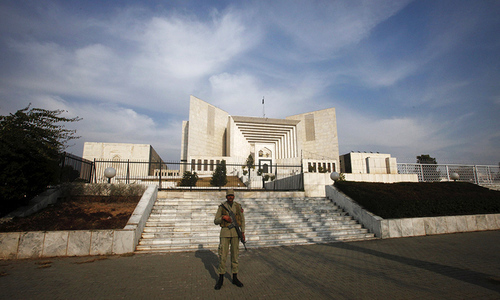ISLAMABAD: The Supreme Court stayed on Tuesday execution of three convicts handed down death sentences by military courts and ordered office of the Attorney General to respond to allegations mentioned in a petition.
The order was issued by a three-judge bench headed by Justice Amir Hani Muslim that had taken up the appeals moved by convicts Ajab Gul, Fazal Ghaffar and Ms Zarba Khelow against the April 13 judgement of the Peshawar High Court (PHC).
The apex court also issued notices to the Judge Advocate General Branch, the legal arm of the armed forces, and postponed further proceedings to a date to be decided later.
A separate five-judge bench of the Supreme Court headed by Chief Justice Anwar Zaheer Jamali is seized with 12 different appeals instituted against convictions by the military courts, including death sentences handed down to militants for their role in various terrorist attacks.
Rights activist Asma Jahangir told Dawn the apex court had stayed the execution of her client, Ajab Gul, the brother of Taj Gul who was awarded a death sentence by a military court.
Taj Gul, a resident of Upper Dir, was handed over to security forces by elders of the area some five years ago.
On April 13, the PHC had upheld the death sentences handed down by the military courts to six militants, including Taj Gul and Fazal Ghaffar.
Ms Jahangir said that although the high court upheld the sentences on the grounds that due process was followed, she pleaded before the court that her client was denied the right, also available under the Pakistan Army Act, to be represented by a suitable legal counsel during the trial.
Moreover, no document was shown to her client to prove that he actually participated in any assault on a government or public property or the personnel of law enforcement agencies, she added.
Her petition claimed that even though their family members met the accused several times at an internment centre at the Pak-Austria Institute of Tourism and Management in Swat, they came to know about their conviction only through media reports on March 15.
A public announcement made by the Inter-Services Public Relations on March 15 said the convict was an active member of the Tehreek-i-Taliban Pakistan and was involved in attacking law enforcement agencies which resulted in the death of police constables and personnel of the Levies force.
A large cache of arms and explosives was recovered from the possession of the convict and he confessed to having committed the offences before a magistrate, for which he was given the capital punishment.
Fazal Ghaffar, 38, was represented in court by Advocate Ahmed Raza Kasuri.
Ghaffar was also detained and subsequently kept at an internment centre until his conviction and award of death sentence by the military court.
The family of this convict also came to know about the death sentence through the media. Ghaffar was charged with attacking personnel of security forces.
Fateh Khan was represented by Advocate Laiq Swati. He was handed over to the security forces on Dec 27, 2009, in the Charbagh area of Swat district and believed to be a teacher at a seminary before his arrest by the security forces.
The counsel too pleaded that his client had been denied fair trial as he was not allowed to engage a defence lawyer of his choice during his trial.
The military courts, set up after the Dec 16, 2014 carnage at the Army Public School in Peshawar, have so far convicted 76 militants, of which 72 have been awarded death sentences and four life terms.
Only eight of the militants have so far been executed, most of them involved in the attack on the Army Public School in Peshawar.
Published in Dawn, May 11th, 2016













































